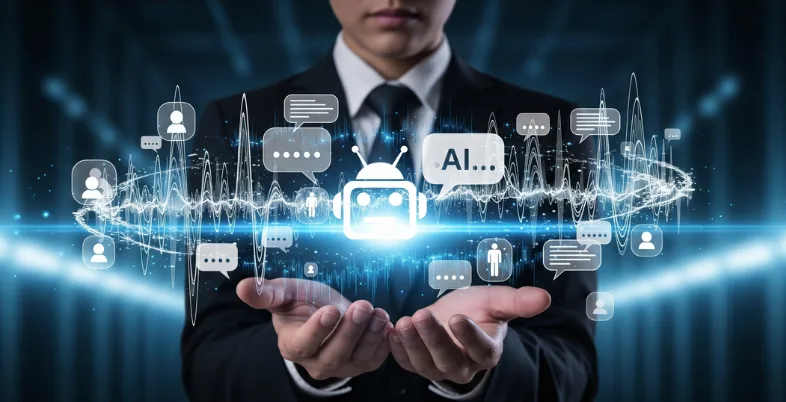Artificial intelligence is no longer a buzzword, but a phenomenon driving the advancement of e-commerce in 2025. From hyper-customized shopping experiences to customer care services that respond to a customer instantly, AI agents are also assisting online retailers to work more efficiently, minimize costs, and create memorable user experiences. Customer expectations remain high as businesses engage in doing everything to ensure customer experience is the best it can be to be competitive, rationalize workflows, and increase conversions at every touchpoint with AI-driven solutions.
In this blog, we dive into the top 10 most powerful and effective AI Agents for E-commerce that are changing the way brands in the eCommerce space are doing, interacting, and expanding, as well. These tools can assist you in scaling quickly and efficiently, regardless of whether you are a small DTC start-up or a giant retailer operating in many cities.
Benefits of Using AI Agents in eCommerce
- Better Customer Experience: real-time and personalized recommendations and support.
- Operational Efficiency: Automated workflows and repetitive tasks allow human teams to spend more time on billable work and reduce time on non-billable tasks.
- Scale and Growth: innovate faster and manage thousands of engagements simultaneously.
- Data-Driven Insights: Customer data allows for better evidence-based decisions and predictive analytics.
- Global Reach: multilingual capabilities allow for seamless communication with clients anywhere in the world.
List of AI Agents for E-commerce
1. Tidio
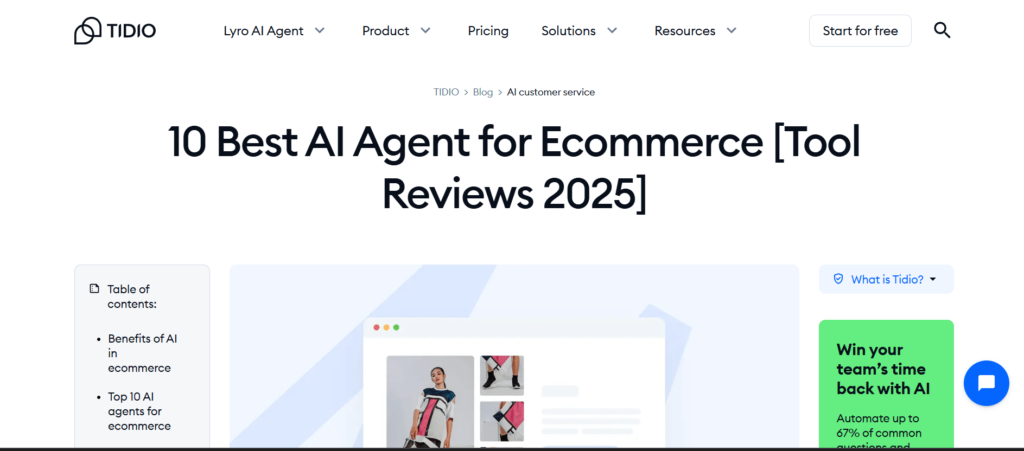
Tidio is a user-friendly chat communication platform with AI features that bundle live chat, chatbots, and multichannel messaging into one platform. It helps businesses automate their responses, suggest products, and respond to customers day and night. The chatbot, Lyro, processes the natural language to give correct responses.
Tidio is particularly useful to small to mid-sized eCommerce businesses that might want to be able to offer real-time assistance while ensuring they are still able to improve customer interaction without resorting to hiring more people to handle incoming queries.
Use cases:
- Automating customer support
- Capturing lead
- Recovering abandoned carts
- Aiding product discovery.
Best for:
- Small to medium eCommerce stores looking for no-code AI chatbots with multi-channel capabilities.
Features:
- Lyro AI natural language chatbot for human-like interactions
- 24/7 customer support automation
- Multilingual support covering 11 languages
2. Intercom (Fin AI Agent)
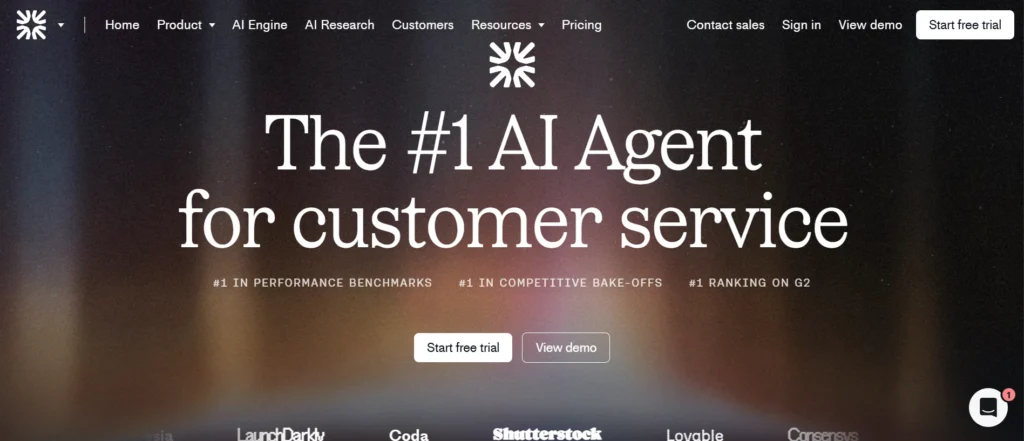
Fin by Intercom is an effective AI assistant that is designed to automate the customer support process and provide immediate responses. It uses your current help center to provide correct live responses and identify the intent of the customers.
Fin has in-built learning abilities and grows to be smarter with time, with escalation to human agents coming with unmatched ease. It decreases the number of tickets, makes work processes smoother, and facilitates the support experience without sacrificing it.
Use cases:
- Enhancing customer service automation
- Visitor segmentation
- Running intelligent customer satisfaction surveys.
Best for:
- Large and enterprise-level eCommerce businesses need sophisticated AI-powered customer engagement workflows.
Features:
- Multiple advanced chatbot templates for diverse scenarios
- Workflow automation for personalized shopper experiences
- Intelligent analytics to measure customer satisfaction
- Visitor segmentation for targeted communication
3. HubSpot AI
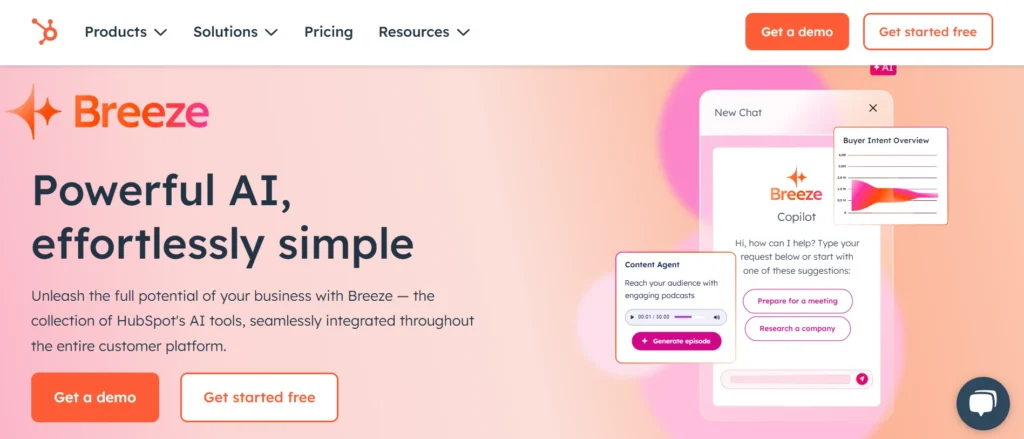
Having embedded the artificial intelligence into the HubSpot CRM package, HubSpot AI is used to automate customer service, marketing, and sales operations. It drives intelligent creation of content, predictions of leads, and customer categories to enable firms to create custom experiences that apply at scale.
Marketers have the opportunity to make email campaigns automatic, and it is possible to create successful subject lines and review customer patterns. In the case of e-commerce brands, HubSpot AI would be best used to bring the combination of customer data and heighten its sphere of expertise using actionable, AI-fueled knowledge.
Use cases:
- Personalizing email marketing campaigns
- Optimizing marketing workflows
- Automating CRM-driven sales processes.
Best for:
- Mid-sized eCommerce companies want a unified platform for marketing and sales enhanced by AI.
Features:
- AI is integrated directly into CRM workflows
- Automated content personalization based on customer data
- User-friendly interface designed for marketers without heavy technical skills
4. Gorgias
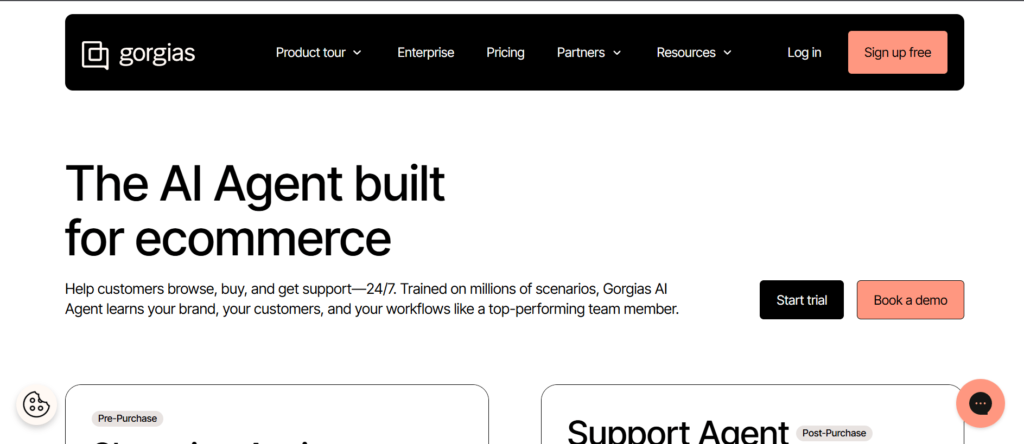
Gorgias is an eCommerce customer service software that allows artificial intelligence support of tickets and communication with consumers through email, chat, and social media. It connects with such platforms as Shopify and Magento to retrieve order information and perform typical support duties.
It flashes, prompts, and then ranks the comments and even provides automatic suggestions of what responses to send. Gorgias enables customer support teams to provide their customers with personalized customer support and achieve better efficiency and organization of communication with customers.
Use cases:
- Automating and streamlining customer support with AI
- Multi-channel ticket management
- Understanding user intent.
Best for:
- Shopify-focused eCommerce merchants aiming for personalized, AI-driven customer support.
Features:
- Deep integration with the Shopify platform
- AI-powered automated responses to common inquiries
- Customer journey insights to tailor support interactions
Suggested Read: Essential AI Development Skills
5. Ada
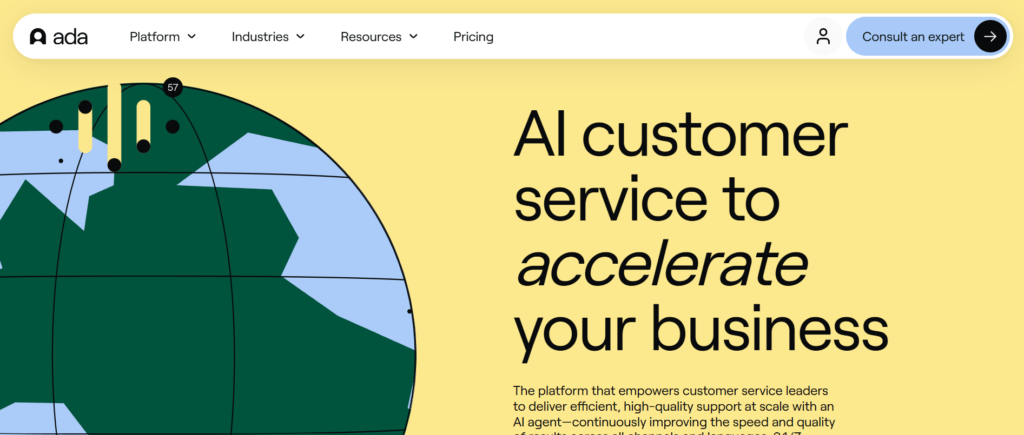
Ada is a no-code AI chatbot platform that scales customer service. It enables companies to build customized and multilingual help processes that manage the most frequently asked questions, tracking, returning orders, and so on.
Ada becomes more and more accurate as it learns to provide better user satisfaction with every interaction. It is particularly useful to enterprise brands of e-commerce that want to provide a 24/7 service at scale in multiple locations globally with no extra human resources.
Use cases:
- Deploying scalable AI
- Virtual agents to handle multi-channel
- Multilingual customer interactions with brand consistency.
Best for:
- Businesses need to deliver consistent AI-supported customer experiences globally at scale.
Features:
- Drag-and-drop chatbot builder requiring no coding
- Flexible API integration capabilities
- Continuous machine learning to improve over time
6. Freshchat
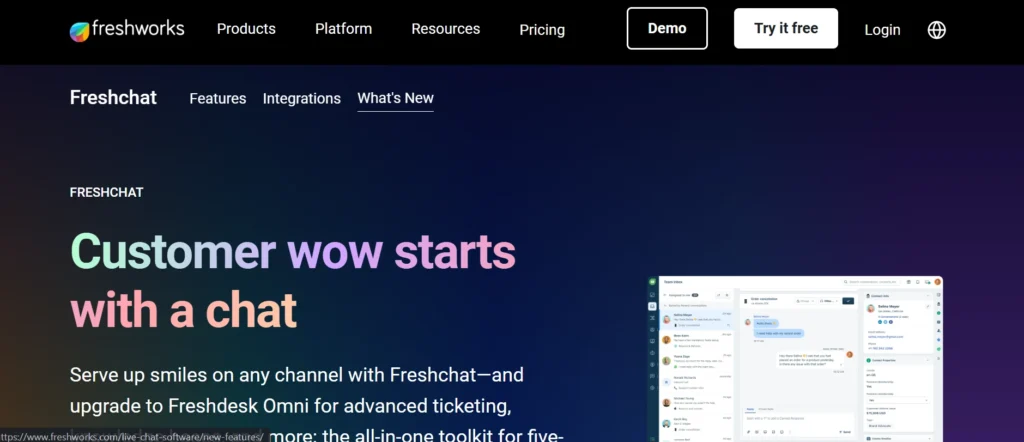
Freshchat by Freshworks provides intent-driven conversational support, powered by AI, through several messaging channels, websites, mobile apps, and the use of WhatsApp. It is an AI-powered platform, powered by Freddy AI, which enables automated responses to frequently asked questions, intent detection, and allows agents to work on more complicated tasks. Onboarding eCommerce companies,
Freshchat has been performing services of balancing between the scalability and personalization, and can give smarter engagement to the growing marketing platform, as well as ensuring that every customer gets a quick and context-conscious response at each touchpoint.
Use cases:
- Delivering context-aware
- AI chat support across devices
- Engaging international customers with multilingual AI replies.
Best for:
- eCommerce brands are aiming to provide 24/7 support for diverse global audiences.
Features:
- AI instant reply functionality to reduce response times
- Support for over 33 languages
- Seamless messaging across mobile, web, and social platforms
7. Drift
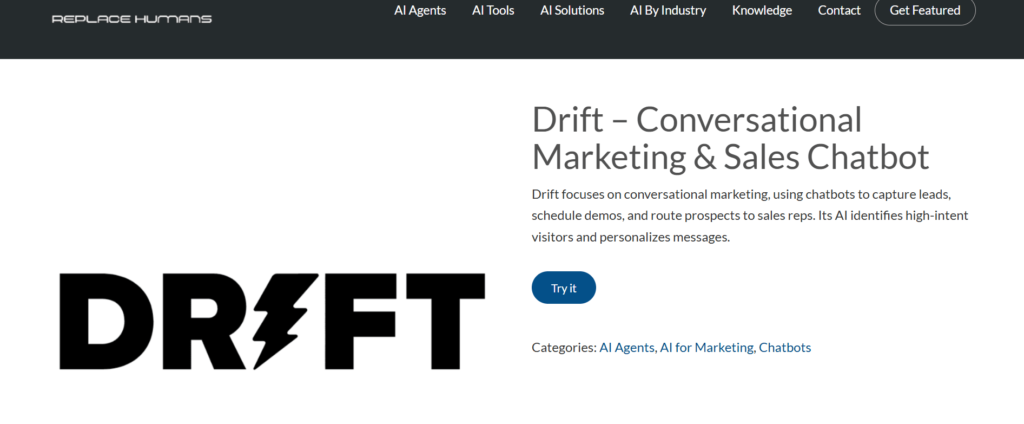
Drift is a platform of conversational marketing where AI chatbots are used to help engage the visitor on the site in real time, attract leads, and automatically schedule meetings. It links high-profile users and directs them to the corresponding sales reps depending on their behavior and profile.
Drift saves time spent on the manual sales process and speeds up the pipeline, as it can deliver the right and personal conversation to the customer at the right time, which is why it is perfect for B2B and high-ticket eCommerce sellers.
Use cases:
- Conducting hyper-personalized sales conversations using advanced AI
- Real-time shopper notifications
- Conversion optimization.
Best for:
- Online stores focused on boosting sales through personalized and data-driven shopper engagement.
Features:
- ChatGPT-powered conversational AI for natural dialogs
- Instant notifications to sales teams for timely responses
- Detailed analytics to refine sales strategies
8. Nosto
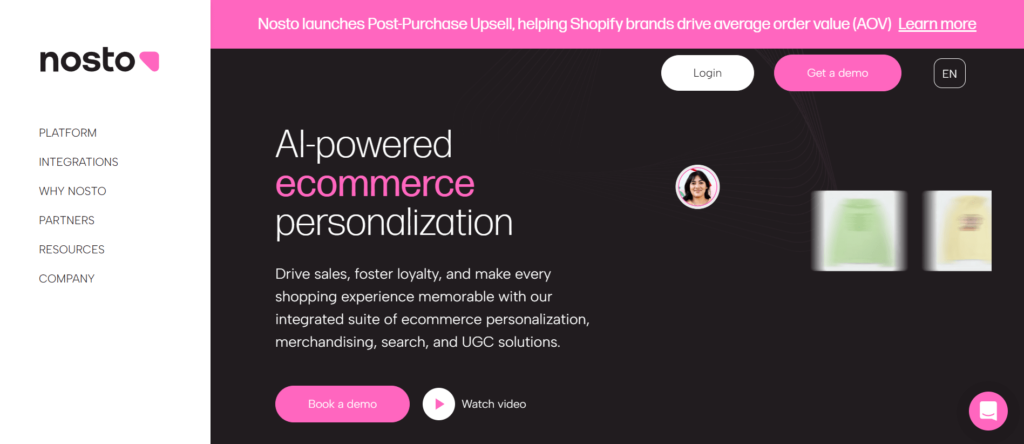
Nosto is a personalization engine that provides real-time product suggestions, content, and behavior pop-ups based on artificial intelligence. It examines the visitor behavior to be able to change the on-site aspect dynamically so that each customer is presented with relevant products and offers.
Nosto makes the difference because it empowers eCommerce stores to engage more customers, get them to spend more per order, and retain more, by offering a personalized shopping experience via various touchpoints.
Use cases:
- Creating AI-driven personalized product recommendations
- optimized search result
- Targeted promotional content.
Best for:
- Retailers who want to increase average order value and engagement through smart personalization.
Features:
- Real-time AI-driven personalization of product catalogs
- Smooth integration with major platforms like Shopify & Magento
- Built-in A/B testing tools to optimize shopper experiences
9. Dynamic Yield
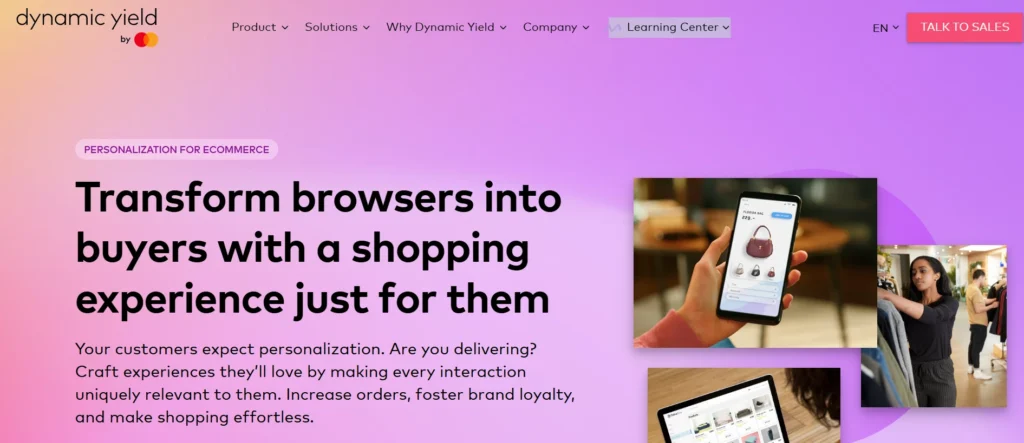
Dynamic Yield maps out the entire customer experience, changing layouts and making product recommendations based on the machine learning of patrons. It allows doing A/B testing, segmenting, and valuable delivery of the content in real time.
Thanks to the predictive targeting and contextual understanding, Dynamic Yield assists eCommerce brands with determining what works and optimizing to that. It works best with companies that want to optimize the user experience and base their growth on data.
Use cases:
- Delivering predictive analytics
- Implementing dynamic pricing strategies
- Offering omnichannel personalization.
Best for:
- Multi-channel retailers requiring a comprehensive AI-powered personalization operating system.
Features:
- Experience OS that matches offers, content, and products to user preferences
- Omnichannel synchronization for a consistent experience
- Predictive AI insights to forecast customer behavior and trends
Suggested Read: Quality Core Tools
10. Recombee
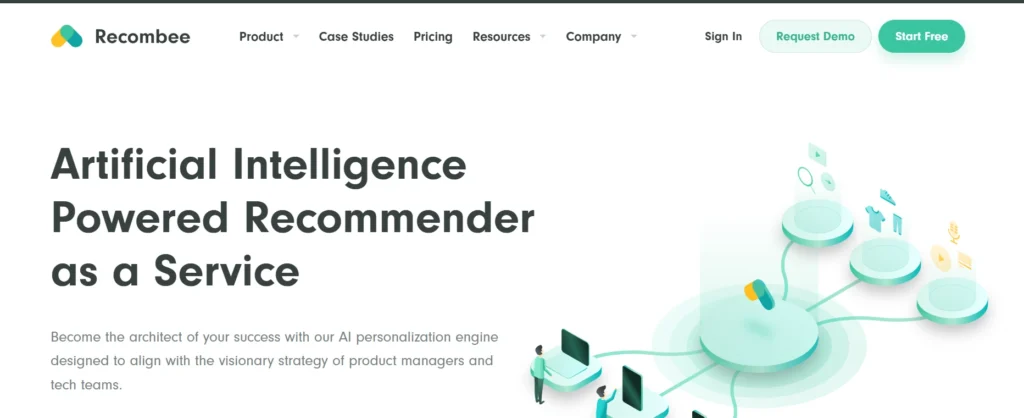
Recombee is a high-performance AI recommendation engine that provides personalized product and content suggestions through the use of deep learning and collaborative filtering. It also has a scalable API, which could be included in websites, applications, and email campaigns.
Because Recombee adapts itself in real time to the behavior of the user, it will help eCommerce platforms to boost conversion and user retention as well as enhance discovery throughout the entire shopping process, leaving full customization and control at its disposal.
Use cases:
- Enhancing product discovery
- Recommendation accuracy
- Particularly for unknown or new visitors.
Best for:
- eCommerce platforms aiming to boost conversion rates with advanced AI recommendations and personalized shopping journeys.
Features:
- Real-time AI-powered product suggestion engine
- Geolocation-based customization for targeted recommendations
- Comprehensive analytics to track recommendation performance
Why AI Agents Are Essential for eCommerce in 2025?
AI agents are no longer just a competitive advantage—they are a necessity for e-commerce growth. Regardless of whether you are a single business owner or you are a part of a large retail business, the platforms can streamline routine tasks, offer the most personalized shopping experiences, and provide value in every customer interaction point. By 2025, to scale up and optimize costs, investing in the correct AI agent will enable the company to keep up with the competition.
Final Thoughts
The future of eCommerce involves customized, automated, data-driven optimization, and AI agents will be bringing that optimization forward to practice. If you already feel a need to increase conversion rates, automate your support contacts, and even make your experience hyper-personalized, the correct AI tools can assist you in scaling without deteriorating the quality of your engagement.
Going deeper into the year 2025, investing in AI agents is not a technology upgrade anymore but a business expansion strategy. Select the tools that best fit your objectives, use them in real situations, and observe how intelligent automation changes your customer experience.
FAQs
Which are the best AI agents for e-commerce development in 2025?
Tidio, Intercom (Fin), HubSpot, Zendesk, Gorgias, Ada, ProProfs Desk, Zoho Desk, Freshchat, and Drift are the most widely used AI agents. These services offer a variety of specialized, AI-powered automation, analytical, and customer support features that can be tailored to the needs and sizes of e-commerce enterprises.
What AI agent is optimal in the case of small to medium-sized eCommerce stores?
The small and mid-size stores have given Tidio a high rating because of its no-code AI automation, live chat, and email automation with a free plan and competitive pricing plans. Gorgias is a favorite of Shopify merchants when it comes to AI-based personalized automations.
Do larger enterprises of e-commerce businesses have AI agents at the enterprise level?
Indeed, Intercom (Fin) offers customizable templates of AI and highly customizable features of workflow, which fit large-scale operations with high-level analytics.
What are the pricing models these AI agents take?
There is much pricing difference, where some are free or provide free trials (Tidio, HubSpot, Freshchat), and some are priced and can start as low as 10 and 39 dollars a month (a monthly subscription model), whereas some will need a custom quote or a salesperson contact (enterprise-level tools like Drift or Ada).


